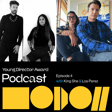
Episode 2 - Yuan Yuan - A Student’s Path
Born in Wuhan, China, Yuan Yuan is a Chinese filmmaker and recent NYU film school graduate whose journey as a student writer-director has garnered awards, grants, and accolades from all corners of the globe. Yuan Yuan sat down with hosts King She to discuss her journey as a director working primarily through the support of academic and festival institutions, pivoting from journalism to narrative filmmaking, and the process of selecting collaborators to be in a space of trust when shooting. Her short film Heading South won Jury Prize at Hong Kong International Film Festival, and Best Student Film at DGA Awards, Palm Springs and Aspen ShortFests, and the Young Director Award. She’s currently developing her first feature, Late Spring with support from the Sundance Writers & Directors labs.
Episode Mentions:
DGA Best Student Film
Sundance Director Lab
Heading South
Spike Lee
Fala Chen
Robert Bresson
This episode is sponsored by Somesuch, Supreme Music, Bonaparte Films, UN.STUDIOS, and Cartel.


